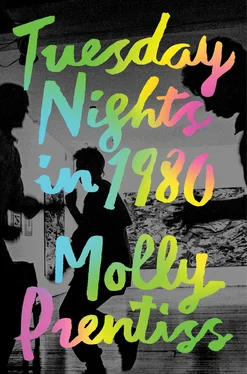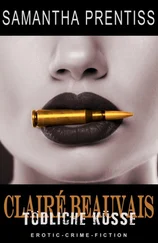The dichotomy between her spirit of rebellion and deep-seated bourgeois traditionalism was perhaps what made James interested in Marge so totally, if only because his own nurture-versus-nature conflict had been so much the opposite. Marge came from the kind of family who played tennis and stuck signs on their lawn for whichever Republican candidate was up for election, but she had managed to divorce herself from their more terrible philosophies during boarding school and had become liberal in all the senses, taking up her father’s passion for the arts but certainly not his politics; her mother’s affinity for bed skirts but not for bras (in those days, Marge often went sans lingerie ). James, who had been raised on stroganoff and soup that somehow came from a box, was endeared and intrigued by the subtle ways in which Marge’s Connecticut childhood blurted out of her at certain moments: when a game was on, she cheered louder than anyone; or at the grocery store, where she wouldn’t buy certain, tackier brands, and favored rich, French foods — salade Niçoise, coq au vin — that one might find on the menu at a country club.
“People who won’t use butter depress me,” she’d say. Or: “I don’t want to think about pâté, but I want to eat pâté, constantly.”
She had a boarding school diligence; she often studied until four or five in the morning, but then later he’d go with her to a party on campus where she’d lay back in a whicker chair, puff on a marijuana cigarette, and say, James, this is how it should be. Just like this, and always.
Back then, neither of them had any problem with being poor. They lived on fried eggs, cans of baked beans, and, because they thought it romantic to gorge on the thing that symbolized their new love, wild strawberries. They’d walk a mile to the water, where they’d fill baskets from a bush that only they knew about, tucked between the river and the Cross Bronx Expressway. The time of day was light orange, the air was diesel and geranium, and she was red, always red, beside him. Her hair, that first summer, was in a braid so long it hit the small of her back when she walked.
On those walks, for the first time in his life, James felt real acceptance. His whole life he had been waiting for it, this perfect, cadmium-color feeling of affirmation. After a lifetime of being misunderstood, here he finally was, at the forefront of someone’s world. Marge’s eyes spoke of infinity. She was plain and brunette. She was red and sturdy. He’d give her a pink rose, a Popsicle, he’d draw her a picture and leave it on the kitchen table. When you spelled her name out, the colors were M (fuchsia), A (pure red), R (orange), G (forest green) and E (the brightest yellow). When they said good night, it did not mean good-bye. When he woke up next to her, said her name, he brightened.
“Why on earth would you pick me?” James often asked her as they lay in bed. “Out of all the men in the world?”
“Because you’re a weirdo,” she’d always say, putting her finger onto his chin or lip. “And I love a good weirdo.”
The summer turned to fall and the strawberries stopped; they settled for a fruit man across the street who wore gloves and sold only small, easy-to-peel tangerines. They had just a year of school left, and each of them already knew it would not be enough; they wanted to stay in their bubble of art and learning and each other for as long as possible. And plus, neither of them knew what they might possibly do afterward; reality seemed surreal and daunting, something they’d stave off until they absolutely had to succumb to it.
“Maybe just a little longer?” Marge would say.
“What are a few more loans?” James agreed.
So together they applied for graduate programs — Marge in fine arts and James in critical and curatorial studies — and together they were accepted. Marge began making beautiful, odd drawings using a mixture of tree clippings and magazine clippings; she called them her Natural Selection series. James became enamored with a course on exiled artists from the late 1700s, specifically with the art of Francisco de Goya. James immediately associated Goya with Picasso’s blue paintings — not for their content but for the color that was at their core, and for their sound, which was in both cases a bold, steady drum. His paper comparing the two painters, which only Marge could have convinced him (with a series of kisses that went from his neck to his pelvis) was valid and perfect and ready to submit, was published in the relatively-new-yet-already-important magazine Art Forum , an unexpected achievement that got James a whopping twenty-five dollars and a flash of orange confidence so strong that it made him want to do something outrageous.
SEVEN: THE VILLAGE/VOICE
If not quite outrageous, the proposal was at least spontaneous. James hadn’t remotely thought it through. It had only occurred to him in that very moment in the middle of the street on that very warm night in the summer of 1970, on their way home from a college bar where he had uncharacteristically taken shots of tequila with some artist friends of Marge’s, that Marge might have any interest in marrying him. Or that he might have any interest in marrying her, for that matter — the whole thing seemed generally archaic and conservative, and on an intellectual level, not for them. But what was intellectual about loving someone? And here was this woman, red and enormously beautiful, walking beside him with all her rosy flesh and interesting thoughts and brain he wanted to live inside, and here he was, so much sillier than her, probably undeserving, walking like a goofball, and yet she loved him, she wanted him, and he was a little drunk, and the moon was out. And there was no other way than this, nothing quite as big as this, to show her how completely he loved her, how gardenia this night felt, how wild strawberry he wanted to make her feel. There was nothing else that seemed so ultimate and right in this very moment. And so he kneeled down in front of her, into a pool of lamplight.
“What are you doing, James?” Marge said with a nervous laugh.
James wavered. He felt drunk on his happiness and the tequila, dizzy from both, and his vision was a hive of swarming red. Suddenly he couldn’t imagine what he would say; his heart cinched and stopped.
“James?”
“Marge!” he managed.
“Jammmeess…” she said.
“I have something I want to ask you!” he practically yelled. His knee was getting wet from the damp concrete. He might throw up.
“Yes?” she said.
“I was wondering if you’d…” Back-of-throat dryness. Back-of-head dizziness. Be normal. Ask her to marry you like a normal person.
“Yes, James?”
“Be like this forever,” he huffed, thinking the worst was over. He got off his knee and hugged her, falling into her a little.
“You’re drunk,” she said.
“On your color!” he said, putting his hand on her face. “I’m drunk on your color because you are the color of pink wine!”
She held him up with her firm shoulder. “You know when I worked at Canary’s they’d have us mix the red and the white together if someone ordered blush?” she said.
“Marry me,” James said quietly.
Marge’s cheeks sunk.
They searched each other’s faces under the lights of the buildings and the shade of the trees and the lights of the stars and the shade of the night.
James grabbed Marge’s face with both hands.
“Come on,” he said, desperate now.
Marge let a smile enter her shocked, wide face.
“Marry me!” James yelled, shaking her shoulders. “Come on!”
Marge’s eyes welled with tears and she let out another huge throaty laugh. “Are you… are you kidding?” she said.
Читать дальше












